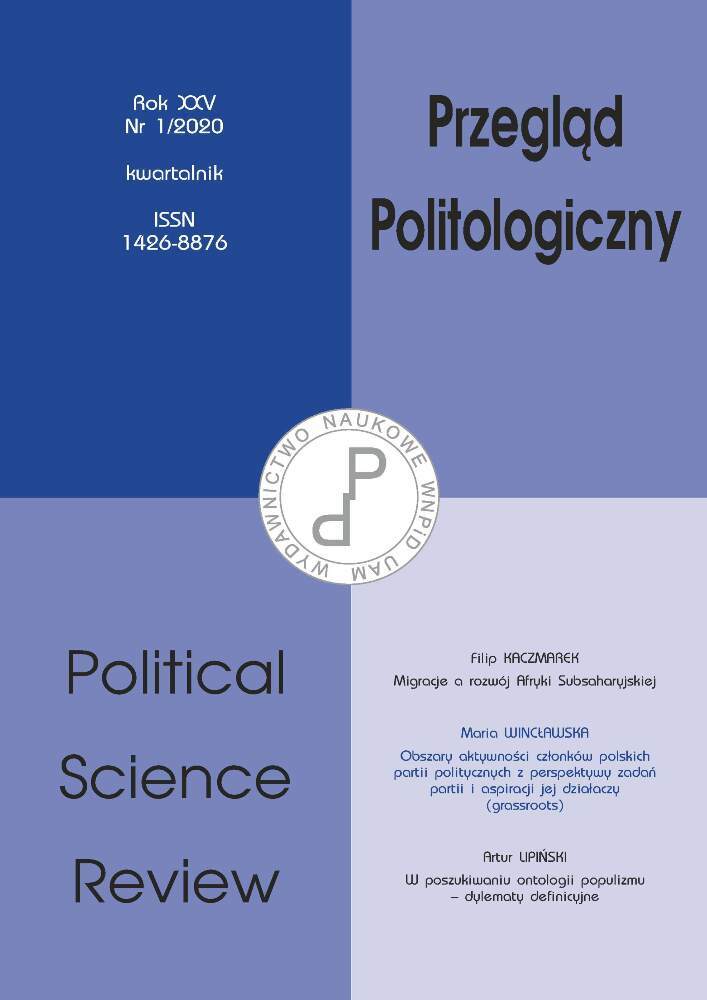Abstract
Members of political parties perform different functions within and for their organizations. Political parties impose upon their members certain tasks and expect them to fulfil them for the common good of the party. The members at the same time have their own image of what do the parties expect of them, but they also have their own expectations towards the parties. The problem I raise in this article is the concurrence of these mutual expectations and activities: (1) perceptions of the tasks the party impose on the members, (2) actual tasks that are performed by the members, and finally their (3) expectations of what forms of activities they would like to undertake within and for their parties. The research was conducted among the members of: the Law and Justice (PiS), the Civic Platform (PO), the Modern (.N), the Polish People’s Party (PSL), the Democratic Left Alliance (SLD) and the Party Together (Razem). Members of these parties filled in questionnaires. As the result of the research it can be stated that the perception of the party expectations towards the members and the tasks they actually fulfil are considerably diverged from the activities they would like to perform. Most of all, the given and performed tasks do not satisfy their ambitions as to be the subjects of the party’s activities and decisions, but only individuals who perform instrumental and legitimising functions for their organizations.
Funding
The article is the result of research conducted in the project
References
Achury S., Scarrow S. E., Kosiara-Pedersen K., van Haute E. (2018), The consequences of membership incentives: Do greater political benefits attract different kinds of members?, „Party Politics”, https://doi.org/10.1177/1354068818754603.
Brodzińska-Mirowska B., Wincławska M. (2019), Why Party Members Matter? The concept of high-quality membership in Polish political parties: communicational and organizational potential, „Czech Journal of Political Science”, vol. XXVI, nr 1.
Clark P., Wilson J. (1961), Incentive Systems. A Theory of Organization, „Administrative Science Quarterly”, vol. 6, nr 2.
Heidar K. (2014), ‘Little boxes on the hillside’ Do all party members look the same?, referat zaprezentowany w czasie warsztatów: „Contemporary Meanings of Party Membership” w czasie ECPR Joint Sessions of Workshops 2014, 10–15 April 2014, Universidad de Salamanca, https://ecpr.eu/Filestore/PaperProposal/dd524f9c-96a4-4da9-8950-88e5f5adbe62.pdf, 23.07.2018.
Katz R. (2013), Should We Believe that Improved Intra-Party Democracy Would Arrest Party Decline?, w: The Challenges of Intra-Party Democracy, red. W. Cross, R. Katz, Oxford University Press, Oxford.
Kosiara-Pedersen K. (2016), Varieties of Party Membership, referat zaprezentowany w czasie 24. Kongresu Światowego Stowarzyszenia Nauk Politycznych (IPSA), maszynopis w posiadaniu autorki.
Scarrow S. (1996), Parties and their Members, Oxford University Press, Oxford.
Scarrow S. (2002), Parties without members? Party organization in a changing electoral environment, w: Parties without partisans. Political change in advanced industrial democracies, red. R. J. Dalton, M. P. Wattenberg, Oxford University Press, Oxford–New York.
Seyd P., Whiteley P. (2002), New Labour’s Grassroots. The Transformation of the Labour Party Membership, Palgrave, New York.
Tavits M. (2012), Organizing for Success: Party Organizational Strength and Electoral Performance in Postcommunist Europe, „The Journal of Politics”, vol. 74, nr 1.
van Biezen I., Mair P., Poguntke T. (2012), Going, going, ... gone? The decline of party membership in contemporary Europe, „European Journal of Political Research”, vol 51, nr 1.
Weber R. (2018), Why do young people join parties? The influence of individual resources on motivation, „Party Politics”, https://doi.org/10.1177/1354068818792576.
Wiatr J. (1999), Socjologia polityki, Scholar, Warszawa.
Wincławska M. (2010), Unia Wolności. Partia polityczna w okresie transformacji, Scholar, Warszawa.
Wincławska M., Brodzińska-Mirowska B. (2016), Niewykorzystane szanse? Polskie partie polityczne w działaniu, Wydawnictwo Naukowe UMK, Toruń.
Whiteley P., Seyd P., Richardson J. (1994), True Blues – The Politics of Conservative Party Memebrship, Clarendon Press, Oxford.
Whiteley P., Seyd P., Billinghurst A. (2006), Thirs Force Politics. Liberal Democrats at the Grassroots, Oxford University Press, Oxfrod.
Young L. (2013), Party Members and Intra-Party Democracy, w: The Challenges of Intra-Party Democracy, red. W. Cross, R. Katz, Oxford University Press, Oxford.
PiS_1_2016 – IDI przeprowadzony z członkiem Prawa i Sprawiedliwości, w dniu 20.12.2016.
PiS_3_2016 – IDI przeprowadzony z członkiem Prawa i Sprawiedliwości, w dniu 30.12.2016.
PiS_7_2017 – IDI przeprowadzony z członkiem Prawa i Sprawiedliwości, w dniu 14.02.2017.
PO_2_2017 – IDI przeprowadzony z członkiem Platformy Obywatelskiej, w dniu 1.02.2017.
PO_3_2017 – IDI przeprowadzony z członkiem Platformy Obywatelskiej, w dniu 2.02.2017.
N_3_2017 – IDI przeprowadzony z członkiem Nowoczesnej, w dniu 16.01.2017.
N_4_2017 – IDI przeprowadzony z członkiem Nowoczesnej, w dniu 6.04. 2017.
N_6_2017 – IDI przeprowadzony z członkiem Nowoczesnej, w dniu 10.02.2017.
PSL_11_2017 – IDI przeprowadzony z członkiem Polskiego Stronnictwa Ludowego, w dniu 6.04.2017.

